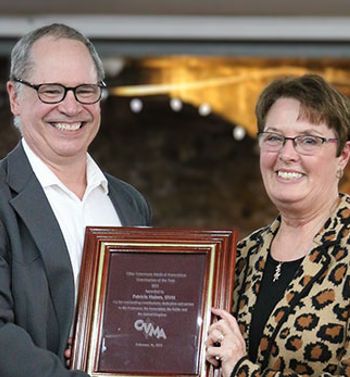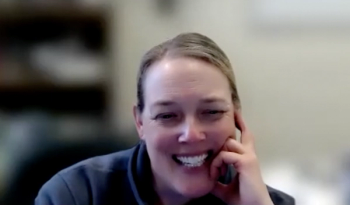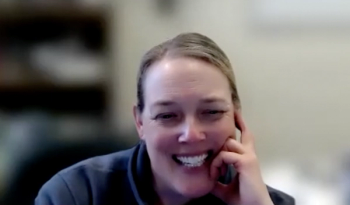
In an interview, Betsy Charles, DVM, MA, described a lecture she is particularly excited to deliver at the upcoming Fetch dvm360® conference.

In an interview, Betsy Charles, DVM, MA, described a lecture she is particularly excited to deliver at the upcoming Fetch dvm360® conference.

In a dvm360® interview, Christopher Pachel, DVM, DACVB, CABC, highlighted what he'll cover in his upcoming session on introducing a new dog or cat to the household.

In an interview, Betsy Charles, DVM, MA, highlighted why she recommends that all kinds of veterinary professionals should attend her talks at the next Fetch dvm360® conference.

In a dvm360® interview, Christopher Pachel, DVM, DACVB, CABC, shared why he doesn't have 1 favorite lecture he is delivering because he is excited for the unique discussion each will inspire.

In an interview, Christopher Pachel, DVM, DACVB, CABC, highlighted what he loves most about Fetch dvm360® conferences.

A veterinary expert shares strategies to maximize communication effectiveness and improve compliance.

In an interview, Betsy Charles, DVM, MA, excitedly detailed the talks she will deliver at the next Fetch dvm360® conference.

In a dvm360® interview, Christopher Pachel, DVM, DACVB, CABC, described what he will cover in his upcoming talk, 'Behavioral Euthanasia Considerations Bringing the Conversation out of the Shadows.'

In an interview, Betsy Charles, DVM, MA, divulged her favorite aspect of Fetch dvm360® conferences.

In an interview, Christopher Pachel, DVM, DACVB, CABC, detailed his upcoming lecture he will be presenting at the Fetch dvm360® conference, 'Medical Conditions Masquerading as Behavior Problems.'

In an interview with dvm360®, new Fetch Faculty member, Leilani Alvarez, DVM, DACVSMR, discussed the talks she will be presenting.

3 videos spotlighting our Fetch Faculty detailing talks they will deliver at the upcoming conference

In an interview with dvm360®, Christopher Pachel, DVM, DACVB, CABC, highlighted what he's looking forward to most when visiting Charlotte, North Carolina for our approaching conference.

In this interview, Bash Halow, LVT, CVPM, highlighted his favorite aspect of Fetch dvm360® conferences.

In this interview with dvm360®, Alyssa Mages, BS, CVT, shares which other Fetch faculty she is excited to hear from next month.

In this interview, Alyssa Mages, BS, CVT, shares a sneak peek of her upcoming 5-part lecture 'The Pivotal Path' that she will be presenting with Sonja Olson, DVM, at next month's Fetch dvm360® conference.

During this interview, new Fetch dvm360® faculty, Leilani Alvarez, DVM, DACVSMR, reflects on how she and Steve Dale, CABC, decided to present a first-of-its-kind talk.

During an interview with dvm360®, Steve Dale, CABC, highlighted his favorite aspects of Fetch conferences.

In this interview, Bash Halow, LVT, CVPM, summarizes what attendees will takeaway from his upcoming lecture on client compliance.

In a presentation at the Midwest Veterinary Conference, Karen E. Felsted, CPA, MS, DVM, CVPM, CVA, addressed the high cost of poor inventory accounting and how to do it right

During a dvm360® interview, Steve Dale, CABC, teased his upcoming Fetch talk on veterinary practice marketing.

Entries are now being sought for best-in-class veterinary facility design across the country

During a recent interview, Steve Dale, CABC, offered viewers a sneak peek into his upcoming Fetch dvm360® conference lecture with Dr Lelaini Alvarez.

It can be easy to get caught up in the day-to-day of practicing as a veterinarian, but a successful hospital requires deliberate effort spent on the business side of the equation.

Outgoing president of the OVMA, Dr Edgar Biggie, had the honor of presenting the award to and appointing each notable individual.

In an interview with dvm360®, a technology and solutions strategist shares why a subscription model can lead to more clients agreeing to preventive care recommendations.

In a dvm360® interview, an associate professor of large animal internal medicine offered insight on selecting the appropriate diagnostic method for horses showing signs of serious illness.

In a dvm360® interview, an associate professor of large animal internal medicine outlined plants to bear in mind that can pose a threat to horses.

The dvm360® team is launching new initiatives and working to reach new heights to serve you and help you better serve patients.

Meghan E. Herron, DVM, DACVB, spoke at VMX about handling common feline nuisance behaviors that cause stress for clients.